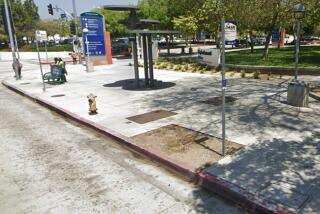Metro Display Ad Pact Is Designed to Recoup Losses
- Share via
SANTA ANA — For eight years, Metro Display Advertising put little effort into soliciting ads for the bus stop shelters it was supposed to manage, the company’s investors say.
But ever since Metro Display filed for bankruptcy protection last year and new management took over, the Tustin company has been on a campaign to find advertisers for the shelters. On Wednesday, the U.S. Bankruptcy Court in Santa Ana approved a marketing agreement between Metro Display and VW Martin Co., a prominent outdoor advertising firm in Los Angeles.
VW Martin will work on a commission based on advertisement sales, said Bill Crabtree, the company’s executive vice president. He would not be more specific.
“We think the synergism between the two companies will increase advertising sales tremendously,” said Scott Kraft, who replaced Metro Display founder Jean Claude LeRoyer as president.
The company had hoped to emerge from bankruptcy Wednesday, but the court postponed that decision until May 4 so that all of the investors could be notified about the reorganization plans. Even so, Metro Display’s marketing agreement goes into effect immediately.
Last year, the FBI opened an investigation of LeRoyer, alleging that he had operated a Ponzi scheme. He has never been charged with a crime, however.
LeRoyer offered investors a creative way of putting their money to work. For about $10,000, an investor could buy a bus stop shelter, then lease it back to Metro Display. The company purported to pay rent to its 1,134 investors out of funds raised by selling ad space on the shelters.
Investors, however, say that the company drummed up little advertising money and left them high and dry when it filed for Chapter 11 reorganization in January, 1992.
The company’s new management team wants to bring Metro Display out of bankruptcy and recoup investors’ money by garnering advertisement dollars. Under the proposal, the shelter owners would become shareholders of the company.
“The only way the shelter owners can get their money back is to effectuate a debt-for-equity swap where, after other creditors have been paid, they will receive dividends on their shares of stock,” said Leonard M. Shulman, an Irvine lawyer who represents the investors.
Shulman said investors should start seeing dividend payments from the advertisements within two years. He said that Metro Display has about 4,000 bus stop shelters in Orange and Los Angeles counties.
Crabtree said VW Martin is pleased by its arrangement with Metro Display. “It’s good for us because they have a major presence in Southern California,” he said. “But it’s even better for them. In the past Metro Display has sought only local advertisers. This will give them national representation.”
More to Read
Inside the business of entertainment
The Wide Shot brings you news, analysis and insights on everything from streaming wars to production — and what it all means for the future.
You may occasionally receive promotional content from the Los Angeles Times.










